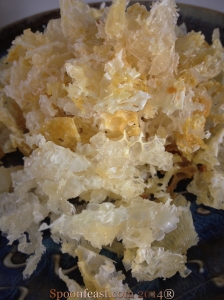Harvesting Greenway Gold Honey
At the college where I work, we got permission to raise honey bees and this week was our first opportunity in harvesting honey.
Bees are in danger and need all the care and help they can get. So to see one of the two hives we have thrived is quite a source of glee and happiness.
I am not a bee keeper but I am a local honey devotee.
Local honey helps with all kinds of pollen related allergies. As someone who was highly allergic to just about anything that grew, once I started consuming local honey and local bee pollen, the allergies for the most part, disappeared!
Let’s hear it for local honey!
On to the harvest!
The box that had the frames which held the honey had been removed from the hive stack the day before.
It really pissed some bees off, Jim got stung a couple of times. Why not? The bees were only protecting their winter survival source.
The “Extraction Room” had to be readied: plastic on the floor, tables, warm honey extracting knife,
centrifuge assembled, screen filters, buckets,
jars and damp paper towels all in place. Don’t forget the tasting spoons!
Each of the frames weighed around 7.5 pounds before removing the honey and 1.5 pounds after. The process is sticky but amazingly rewarding.
Once you have everything ready to go, one of the frames is placed so the wax caps can be removed from both sides of the frame using a warm knife made for doing just these kinds of things. Catching the wax caps in a bucket below is a great idea as this is “virgin” beeswax, perfect for making lip balms and body lotions; just wash the honey out gently in cool water.
Place the frames in the centrifuge, there’s a certain angle they have to be placed because the bees create the honey combs on a particular angle to prevent the honey leaking out. Clever things!
Once the honey is spun out of the combs, it needs to be filtered.
It gets filtered through a larger screen mesh then into a fine mesh into a clean bucket below.
Then it is ready to bottle. When the honey is first bottled, there are a lot of air bubbles in it.
Due to the viscosity of the honey, it takes some time for them to rise and leave behind the clear, lovely color of the honey.
From our first harvest, we extracted 3.81 gallons!
We are naming it “Greenway Gold” since the hives are near the Greenway here in Charlotte.
Look at our stash!
Our honey is pale yellow and has a very floral flavor, similar to an orange blossom. It is delicate and sweet and couldn’t get any more local. Heck, it’s made just outside my office door!
Here’s an amazing part: the bees will refill the empty combs and will “clean up” any honey left on any of the buckets and other things. It’s good for them. Our main concern is the equipment getting stolen so Jim takes the things home for his home bees.
Did you know a honey bee will only produce about 1 teaspoon of honey in its lifetime? These are amazing critters.
There is a “Bee School” around here that is working hard to encourage people to keep bees. I don’t think I’d ever actually keep my own, but I will certainly continue to help with the honey extraction!
Now I can have some honey flavor in my lip balm formulas, won’t that be nice?













All those jars of honey look lovely, I have never seen this process before 😀
It was great learning about it!
Cheers
Choc Chip Uru
It was sticky but tremendously rewarding!
Dare I comment… sweeeeeeet!?
And delicious too!;)
What a wonderful project. I would love to keep bees but I react badly to their stings.
Me too, so I keep my distance. I couldn’t resist the honey!